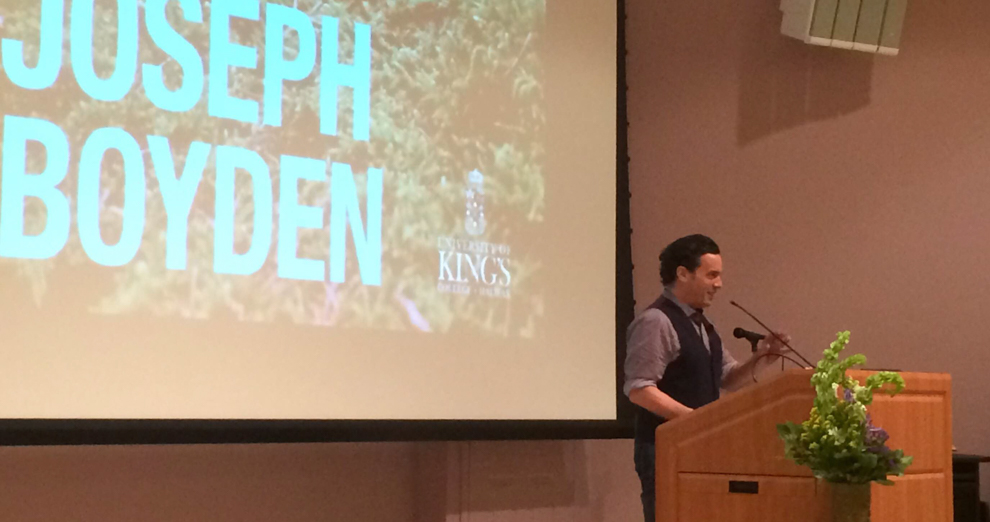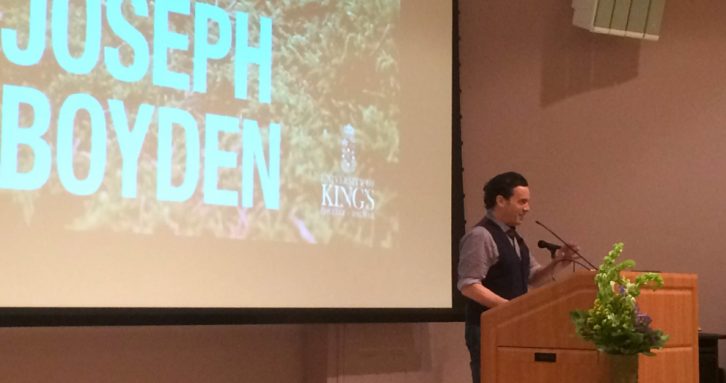Education
Author Joseph Boyden gives Fountain lecture
Talk draws attention to mental illness, Indigenous issues

caption
Joseph Boyden speaking at the Fountain lecture on Thursday night.
caption
Joseph Boyden spoke during the Fountain lecture on Thursday night.The pressing need for a dialogue around mental illness and Indigenous issues was the focus of this year’s Alex Fountain Memorial Lecture at the University of King’s College.
Canadian author Joseph Boyden delivered the talk titled “This Writer’s Life: Embracing the Voices” to a room packed with students and community members Thursday night.
Boyden began by speaking a few words in Anishinaabe, including a saying that means “everybody matters, everybody counts.” Boyden says his Anishinaabe name translates to “one who enlightens” in English. He considers that name his calling. Related stories
“This is what I do as a writer, as an activist, as somebody who fights for the rights of all people,” he said.
Boyden has European and Anishinaabe heritage. His writing focuses on First Nations culture, including his novels Three Day Road, Through Black Spruce and The Orenda.
Speaking about mental illness
Boyden shared a dark chapter of his youth with the audience by reading from his story “Walk to Morning.” The story recounts his suicide attempt as a teenager when he was beginning a lifelong battle with depression. He dedicated the reading to the Fountain family, who sponsored the event in honour of their son Alex Fountain, who died by suicide in 2009.
“I tell this story in hope of reaching someone out there, even one person who is suffering the pain I speak of,” said Boyden. “If you hear this, talk. Speak it out loud. Walk through that night if you need to, walk away from the road. Walk to morning. Allow this paint to be exposed to sunlight instead.”
Boyden said it is important that people start looking at mental illnesses with the same attitude they have towards physical illnesses.
“It’s time that we treat mental health issues with kindness rather than walking away from the person that is suffering,” he said.
The author told the crowd he has faced three dark periods of depression in his adult life. For Boyden, writing has always been a means of dealing with his pain.
He also addressed the issue of mental illness and suicide in First Nations communities, a result of the intergenerational trauma of residential schools.
Boyden read passages from Wenjack, his recently released novella about 12-year-old Chanie Wenjack, an Ojibwe boy who died running away from his residential school. He wrote the novella as part of a collaboration of Canadian artists paying tribute to Chanie, including the Secret Path project.
“I could not not write his voice,” said Boyden, explaining that he felt connected to the boy as he was writing the story. He hopes it will start conversations about reconciliation in Canada.
“Reconciliation isn’t a light word; it’s a heavy thing (and) it’s not just for Indigenous people, it’s for everyone.”
Every year, the Fountain family invites the student body to bring in a guest speaker of their choosing. Fred Fountain, Alex’s father, also spoke to the crowd on Thursday night.
“This lecture is a stimulating and thought-provoking annual event in memory of Alex,” said Fountain. He added that the lecture is meant to bring students together because his son was “all about inclusiveness” and “a sweetheart who loved King’s.”
Alex Fountain battled depression. His father urged anyone in the crowd dealing with mental illness to reach out to someone they trust and get help.
“We do not want to lose you,” he said.

